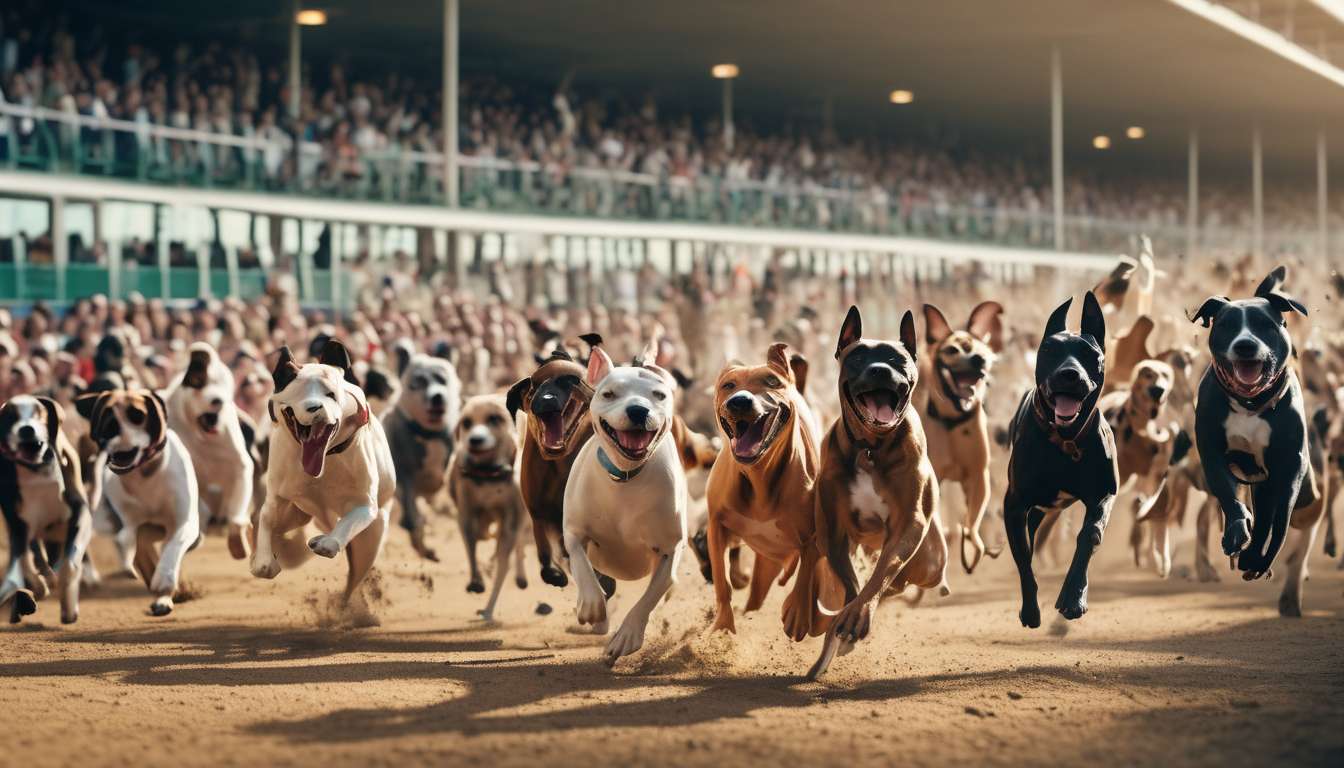Dog betting is a fascinating world, but it’s riddled with myths that can mislead both newcomers and experienced bettors. This article aims to debunk 12 common dog betting myths, providing you with the facts needed to make informed decisions.
Misunderstood Betting Strategies
Many bettors believe in certain "guaranteed" strategies. However, no strategy can ensure success every time. Understanding probability and risk management is more beneficial than relying on so-called foolproof methods.
Breed Myths
There’s a misconception that certain breeds always win. While some breeds may have traits conducive to specific sports, no breed guarantees victory. Performance depends on individual dogs and various factors, including training and health.
Myth 1: Always Bet on the Favorite
- Favorites don’t always win.
- Odds reflect public perception, not guaranteed outcomes.
Myth 2: Past Performance Guarantees Future Results
- Dogs can have off days.
- Many factors affect a race, including conditions and competition.
Myth 3: Inside Information is Key
- Relying on rumors can be misleading.
- Focus on research and reliable data.
Myth 4: Betting More Guarantees More Wins
- Larger bets increase risk, not certainty.
- Sensible budgeting is crucial for long-term success.
Myth 5: Only Experts Win
- Anyone can learn to bet wisely.
- Education and experience improve betting skills.
Myth 6: Always Bet on Home Dogs
- Home advantage isn’t always significant.
- Consider all factors, not just location.
Myth 7: Certain Races Are Easier to Predict
- Each race has unique variables.
- Assess each race individually.
Myth 8: Betting on Multiple Dogs Increases Chances
- Spreads risk but can reduce potential profit.
- Focus on quality bets, not quantity.
Myth 9: Big Events Are Best for Betting
- High-profile events attract more competition.
- Smaller events can offer less crowded opportunities.
Myth 10: Always Follow Trends
- Trends can be misleading.
- Analyze current data instead of relying on past patterns.
Myth 11: Luck is a Major Factor
- Betting is about informed decisions, not chance.
- Knowledge reduces reliance on luck.
Myth 12: Betting is a Way to Get Rich Quick
- Success requires patience and strategy.
- Treat betting as a hobby, not a primary income source.
By challenging these myths, we hope to foster a more informed and engaging experience for all dog betting enthusiasts. Understanding the reality behind these beliefs will enhance your enjoyment and success in the world of dog betting. Let’s continue to unveil the truth together.
Betting Strategy Misconceptions
Many bettors mistakenly believe that following the crowd will lead to consistent wins in dog betting. We’ve all been there, feeling the comfort of going along with popular opinion during a dog racing event. However, this approach often falls flat. Why? Because these betting myths overlook the importance of analyzing performance predictors that can truly influence race outcomes.
Instead of just relying on what others say, let’s focus on understanding the individual dogs. Each dog has unique attributes and past performances that can signal how they’ll fare on race day. By examining factors like:
- Track conditions
- Recent form
- The dog’s demeanor
we can make more informed decisions.
By breaking away from the herd mentality, we strengthen our community of knowledgeable bettors who are in it for more than just a quick win. We seek to understand the sport, honing our skills and insights. Together, we can debunk these misconceptions and elevate our dog racing experiences.
Breed Performance Fallacies
Many of us wrongly assume that a dog’s breed is the most reliable indicator of its success in a race. We often fall into the trap of believing certain breeds are unbeatable, relying on breed stereotypes as performance predictors. However, this is one of the most common betting myths in dog racing. While breed characteristics can offer some insights, they don’t guarantee a win.
In dog racing, each dog’s unique traits, training, and health play crucial roles in their performance. By focusing solely on breed, we overlook these vital factors. Community members in the dog racing world know that dogs of the same breed can perform quite differently depending on their individual experiences and conditions.
When placing bets, let’s remind ourselves that it’s not just about the breed. We need to consider a dog’s overall capabilities and recent performances. By doing so, we become part of a more informed and connected betting community, where we support each other in making smarter choices.
Myth: Always Bet on Favorites
Many of us mistakenly believe that betting on favorites is the safest strategy for consistent wins. In dog racing, this is one of the most common betting myths that can mislead both newcomers and seasoned enthusiasts. We often assume that favorites have a higher likelihood of winning because they’re perceived as the top contenders. However, placing our bets solely on favorites can lead us astray.
Performance predictors in dog racing are complex and can’t be reduced to simply favoring the top dog. Several factors play significant roles in determining the outcome:
- Track conditions
- The dog’s health on race day
- The handler’s expertise
By relying too heavily on favorites, we might miss out on better opportunities with higher returns.
Let’s challenge this myth together and explore a more holistic approach to our betting strategies. By understanding the nuances of dog racing, we can become more informed bettors and strengthen our sense of community within the sport.
Myth: Past Performance Predicts Future
One of the most common betting myths in dog racing is the assumption that a dog’s past performance will guarantee future success on the track. Many believe that past victories, impressive speeds, and consistent finishes are reliable predictors of future performance. However, the reality is far more complex.
Dog racing is highly unpredictable, with numerous variables influencing outcomes, such as:
- Conditions on race day
- The dog’s health
- Minor changes in diet or routine
Just as in our own lives, past success doesn’t always equate to future triumphs. By placing too much faith in historical results, we risk overlooking other critical factors.
As a community, we should remind ourselves that while history provides insights, it doesn’t dictate destiny. We are united by our love for the sport, and together, we can deepen our understanding beyond mere statistics.
Embracing this perspective enriches our shared experience and strengthens our collective wisdom.
Myth: Inside Information Advantage
Many of us believe that insider tips give us a significant edge in dog racing bets. We feel a sense of belonging when we’re privy to what seems like secret knowledge. However, let’s debunk this betting myth. The idea that having inside information is a foolproof performance predictor is misleading.
In dog racing, numerous variables can impact the outcome, and no tip can account for them all. Factors such as:
- The dog’s health
- Track conditions
- The day’s weather
play crucial roles that aren’t always covered by insider info.
We’re often tempted to trust that someone in the know has the golden key to winning. However, dog racing is unpredictable, and those so-called inside tips can lead us astray.
Rather than relying on this myth, let’s focus on understanding the broader patterns and data. This approach helps us make informed decisions and fosters a deeper connection with the community of thoughtful bettors who value insights over rumors.
Myth: Betting More Equals More Wins
Many of us mistakenly believe that increasing our stakes will naturally lead to more victories in dog racing bets. This common betting myth gives us a false sense of control over the unpredictable nature of the races. We need to remember that betting more doesn’t change the odds or enhance the performance predictors in our favor.
The thrill of dog racing can be addictive, and it’s easy to get caught up in the excitement, thinking that a bigger bet somehow guarantees a win. In reality, dog racing outcomes remain uncertain, regardless of how much we wager.
Our sense of community thrives when we share strategies and insights, not when we fall into the trap of thinking more money means more wins. Let’s focus on:
- Understanding the dogs’ performance
- Analyzing track conditions
- Reviewing past results
By doing so, we’re not only guarding our wallets but also enriching our shared experience in the world of dog racing.
Myth: Only Experts Succeed
We often assume that only seasoned experts can win in dog racing, but that’s far from the truth. In reality, everyone has the potential to succeed, regardless of their experience level. Betting myths like this one can discourage newcomers from participating, but we can all engage and thrive by understanding the fundamentals.
Dog racing is a sport where many factors come into play. Performance predictors such as:
- A dog’s health
- Track conditions
- Recent form
can be just as valuable as expert insights. As a community, we have access to a wealth of information that allows us to make informed decisions, leveling the playing field between newcomers and long-time enthusiasts.
By sharing knowledge and strategies, we support each other and break down barriers. Betting success isn’t reserved for a select few; it’s something we can all achieve together. Let’s embrace the excitement, trust our instincts, and enjoy the camaraderie that comes with participating in dog racing.
Myth: Home Advantage Assumption
Many of us mistakenly believe that dogs perform better on their home tracks, but this assumption doesn’t always hold true. In the world of dog racing, it’s easy to get swept up in betting myths, and the idea of a "home advantage" is one of the most common. We want to feel confident in our choices, but relying solely on a dog’s familiarity with a track can lead us astray.
While home tracks might offer some comfort, they aren’t reliable performance predictors. Factors like the dog’s physical condition, recent training, and competition level play a more significant role in determining outcomes.
- Physical condition
- Recent training
- Competition level
We’ve seen dogs excel on unfamiliar tracks just as often as they stumble on home turf.
By focusing too much on this myth, we risk overlooking more critical elements that can truly impact a race. Let’s embrace a broader perspective, considering multiple variables, so we can make more informed decisions and feel truly connected to the dog racing community.
What are some common myths about the financial risks associated with dog betting?
We’ve come across some common myths about the financial risks of dog betting. It’s surprising how many misconceptions exist around this topic.
One major myth is that dog betting always leads to big losses. In reality, this isn’t entirely true. With proper research and responsible betting practices, it is possible to minimize financial risks and even make profits.
Here are some strategies to manage risks and potentially profit from dog betting:
-
Conduct Thorough Research:
- Study the dogs’ past performances.
- Understand the conditions and variables affecting the race.
-
Practice Responsible Betting:
- Set a budget for betting activities.
- Avoid chasing losses by betting more than you can afford.
-
Stay Informed:
- Keep up with the latest news and trends in dog racing.
- Learn from experienced bettors and adapt successful strategies.
Understanding the facts behind the myths can help us bet smarter and enjoy the experience more. By applying these strategies, you can approach dog betting with a more informed and strategic mindset, potentially enhancing both your enjoyment and financial outcomes.
How can external factors, such as weather or track conditions, impact the outcome of dog races?
Weather and track conditions play a crucial role in determining the outcome of dog races.
Rain can make the track slippery, affecting a dog’s speed and agility.
Strong winds can also impact a dog’s performance by altering its ability to maintain balance.
As responsible bettors, we always consider these external factors when analyzing races to:
- Make informed decisions.
- Increase our chances of success.
Are there any regulations or laws that govern dog betting, and how do they affect bettors?
Regulations and Laws in Dog Betting
As bettors, understanding the regulations and laws that govern dog betting is crucial. These rules can significantly impact our experience, influencing everything from the types of bets we can place to how winnings are distributed.
Key Aspects Affected by Regulations:
-
Types of Bets Allowed
- Some regions may only allow specific types of bets, such as win, place, or show.
- Others may offer a broader range, including exotic bets like trifectas or parlays.
-
Winnings Distribution
- Laws dictate how winnings are calculated and distributed.
- Tax implications on winnings can vary, affecting the net payout.
-
Fair Play and Integrity
- Regulations ensure the integrity of dog races, preventing fixing or insider betting.
- Licensing requirements for tracks and betting establishments maintain standards.
-
Consumer Protection
- Rules are in place to protect bettors from fraudulent practices.
- Mechanisms for handling disputes and complaints are established by law.
Importance of Understanding Regulations:
-
Informed Decisions: Knowing the regulations helps bettors make informed decisions and avoid legal pitfalls.
-
Fair Betting Environment: Regulations ensure a fair and enjoyable betting environment for all participants.
By being aware of these laws, bettors can navigate the dog betting scene more effectively, enhancing their overall experience.
Conclusion
You’ve now learned the truth behind common dog betting myths.
Key Points to Remember:
-
Betting Strategy and Breed Performance:
- These factors are more important than simply following favorites or relying solely on past performance.
-
Avoiding Misconceptions:
- Don’t be swayed by myths about inside information.
- Believing that more bets guarantee more wins is a misconception.
-
Success in Dog Betting:
- Success is not limited to experts.
- Home advantage isn’t always a sure thing.
Tips for Betting:
- Stay informed about the races and the dogs involved.
- Trust your instincts.
- Approach each bet with a clear, well-thought-out strategy.
By focusing on these strategies, you can bet more wisely and potentially increase your chances of success.




